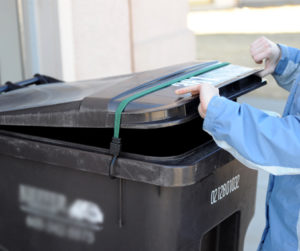 Having trouble with animals raiding your garbage cans and creating an awful mess? You’re not alone. Dogs, cats, raccoons, opossums, rats and other animals can have a king-sized buffet if they get into your trash—even if the lids on your cans are latched on properly.
Having trouble with animals raiding your garbage cans and creating an awful mess? You’re not alone. Dogs, cats, raccoons, opossums, rats and other animals can have a king-sized buffet if they get into your trash—even if the lids on your cans are latched on properly.
First, let’s cover some things you shouldn’t do:
Don’t put your trash out early. Don’t put your cans out until shortly before the scheduled for pickup.
Don’t pour bleach, ammonia or other chemicals on the garbage. Animals might be repelled only temporarily, and the chemicals can damage your yard and environment. Also, garbage handlers aren’t fond of strong chemicals coating their hands and clothes.
Don’t shoot or poison the animals. They’re hungry, they smell food and they need to eat to survive. They don’t realize they’re causing you trouble. If it’s a pet, such as a neighbor’s dog or cat, contact the owner and explain the problem. You should contact local animal control if you need help solving the problem.
Now, here are some options for deterring the scavengers:
Stake the handles. If your garbage cans have handles, drive stakes into the ground and place the handles around them. It prevents animals from knocking over the cans.
Try bungee cords. Connecting bungee cords helps secure the lids and, if you wrap them around multiple cans, may keep them in an upright position. You also may try connecting the cords to a fence or other structure.
Put them in a box. Put the cans in a wooden or plastic box with a lid and clasp. It hides unsightly cans and adds another level of protection from animals. Please check association guidelines to ensure your box complies.
Of course, it’s another matter if bears are the culprits. They’re stronger and a little more determined than your average scavenger. The only way you’re guaranteed to keep bears out of your trash is a bear box. Be sure to contact the association first. You may not be the only one with bear trouble, and the association may want to consider purchasing bear boxes for the community or alerting residents to the problem.




